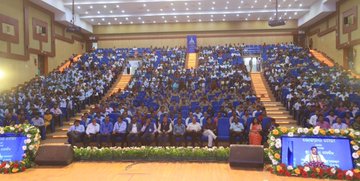CBSE Schools can now teach in regional languages, approves board
New Delhi: In a significant move to promote multilingual education and uphold the principles of the National Education Policy (NEP) 2020, the Central Board of Secondary Education (CBSE) has urged its affiliated schools to consider using Indian languages as optional mediums of instruction.
This initiative aims to offer students the opportunity to learn and excel in various languages while preserving and celebrating the linguistic diversity of India.
CBSE Director (Academic), Joseph Emmanuel, emphasized the Ministry of Education and the National Council of Education, Research, and Training’s (NCERT) efforts to introduce education in multiple languages under the NEP 2020. He called upon schools to harness available resources and collaborate with each other to effectively implement multilingual education.
The board’s proposal recommends using Indian languages listed in Schedule 8 of the Indian Constitution as a medium of instruction from the foundational stage to the end of the secondary stage. This means that students, from pre-primary classes up to class 12, can choose to study in their mother tongue or any other Indian language, alongside the existing options. The move aims to empower students to learn in languages they are comfortable with and foster a deeper connection with their culture and heritage.
Joseph Emmanuel encouraged schools to explore available resources, seek advice from experts, and collaborate with other institutions to share best practices for successful implementation. While acknowledging the challenges posed by multilingual education, such as the availability of skilled teachers and high-quality textbooks in various languages, the CBSE expressed its commitment to address these obstacles in conjunction with the NCERT.
To facilitate the availability of textbooks in multiple Indian languages, the NCERT has prioritized the task and is working towards ensuring that textbooks in 22 scheduled languages will be accessible to all students starting from the next academic sessions.
Furthermore, the CBSE highlighted that higher education institutions have also responded positively to the need for multilingual education. Many of them now offer courses and conduct exams in different languages, including technical, medical, vocational, skill-based, and law education.
By advocating for multilingual education, the CBSE seeks to lay a strong foundation for linguistic diversity, cultural understanding, and inclusive learning in schools across the country. This step towards embracing Indian languages in the education system is expected to play a crucial role in nurturing well-rounded individuals with a deep appreciation for their linguistic heritage and an ability to communicate effectively in a multilingual world.

